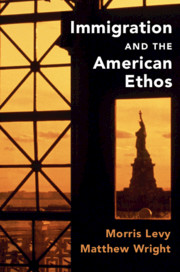Book contents
- Immigration and the American Ethos
- Cambridge Studies in Public Opinion and Political Psychology
- Immigration and the American Ethos
- Copyright page
- Contents
- Figures
- Tables
- Preface
- Prologue
- 1 What Do Americans Want from Immigration Policy, and Why?
- 2 Civic Fairness and Group-Centrism
- 3 Functional Assimilation, Humanitarianism, and Support for Legal Admissions
- 4 Civic Fairness and the Legal–Illegal Divide
- 5 Civic Fairness and Ethnic Stereotypes
- 6 Assimilation, Civic Fairness and the “Circle of We”
- 7 Conclusion
- Notes
- Bibliography
- Index
- Books in the series
7 - Conclusion
Published online by Cambridge University Press: 25 January 2020
- Immigration and the American Ethos
- Cambridge Studies in Public Opinion and Political Psychology
- Immigration and the American Ethos
- Copyright page
- Contents
- Figures
- Tables
- Preface
- Prologue
- 1 What Do Americans Want from Immigration Policy, and Why?
- 2 Civic Fairness and Group-Centrism
- 3 Functional Assimilation, Humanitarianism, and Support for Legal Admissions
- 4 Civic Fairness and the Legal–Illegal Divide
- 5 Civic Fairness and Ethnic Stereotypes
- 6 Assimilation, Civic Fairness and the “Circle of We”
- 7 Conclusion
- Notes
- Bibliography
- Index
- Books in the series
Summary
Stephen Hawking’s A Brief History of Time1 begins with a famous anecdote about a “little old lady” who challenges a scientist’s public lecture on astronomy, insisting that in fact the earth is flat and rests on the back of a giant tortoise. When the scientist asks what holds the tortoise in its place, the lady is ready for him: “You’re very clever, young man, very clever … but it’s turtles all the way down!” Too often, it seems to us, both the guiding assumption and core insight of sociopsychological accounts of mass opinion is that “it’s groups all the way down.”
- Type
- Chapter
- Information
- Immigration and the American Ethos , pp. 169 - 184Publisher: Cambridge University PressPrint publication year: 2020

